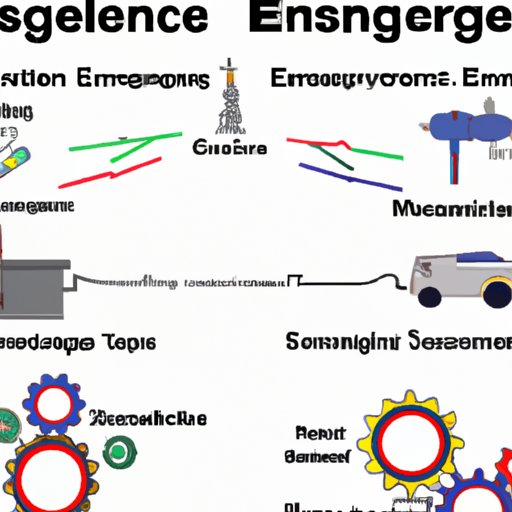Introduction
Engineering sciences are an interdisciplinary field of study that combines knowledge from mathematics, physics, chemistry, biology, and other scientific disciplines with engineering principles to create innovative solutions to challenging problems. These solutions often involve the use of cutting-edge technology to improve existing systems or develop new ones. Engineering sciences are used in a variety of industries, including aerospace, automotive, biomedical, chemical, construction, electrical, environmental, and mechanical engineering.

Definition of Engineering Sciences and How They Work
Engineering sciences are the application of science, mathematics and engineering principles to solve complex problems. The primary goal of engineering sciences is to design, construct, and maintain systems that will meet the needs of society. These systems range from small scale prototypes to large scale infrastructure projects. Engineering sciences require an understanding of the physical, chemical, biological, and social sciences as well as an understanding of engineering principles and techniques.
The process of engineering sciences typically begins with problem identification and definition. Once the problem is identified, engineers must analyze the situation and develop a solution. This involves researching existing solutions, designing a prototype, testing it, and then refining the design until it meets the desired specifications. Once the solution is developed, engineers must design processes to ensure that it is built correctly and works efficiently. Finally, engineers must manage the project and ensure that it is completed on time and within budget.

Exploring the Applications of Engineering Sciences
Engineering sciences are used in a wide variety of industries and applications. They are used to develop solutions to global challenges such as climate change, energy efficiency, and water conservation. Additionally, engineering sciences can be used to develop new technologies, enhance safety protocols, and improve infrastructure. For example, engineers have used engineering sciences to develop new materials for use in medical implants, design safer airplanes, and build more efficient bridges.
Examining the Role of Engineering Sciences in Developing Solutions to Global Challenges
Engineering sciences can play a vital role in developing solutions to global challenges. According to the American Society of Civil Engineers, “Civil engineers are uniquely qualified to lead the development of solutions to global challenges through the integration of engineering principles, scientific research, and public policy.” By leveraging their expertise in engineering sciences, civil engineers can help address issues like climate change, energy security, water scarcity, and global poverty.
Case Studies of Engineering Sciences Projects and Their Impact
There are numerous examples of successful engineering sciences projects around the world. One example is the building of the Panama Canal, which was completed in 1914. The canal was a massive engineering feat that revolutionized international trade by connecting the Atlantic and Pacific Oceans. Another example is the development of the Internet, which has transformed the way people communicate and do business. The Internet has also opened up new opportunities for education and economic growth in many countries.
In addition to these large-scale projects, engineering sciences can also be used to develop smaller scale solutions to everyday problems. For instance, engineers have used engineering sciences to develop new medical devices, improve the safety of automobiles, and make buildings more energy efficient. These solutions have had a significant impact on people’s lives and have helped create a better world.
Looking at the Future of Engineering Sciences
The future of engineering sciences looks bright as new technologies and innovations continue to emerge. As engineers continue to push the boundaries of what is possible, they will be able to develop even more sophisticated solutions to global challenges. Additionally, the demand for engineering sciences professionals is expected to increase as the need for infrastructure projects grows.
Potential Impact of Engineering Sciences on Society
Engineering sciences have the potential to dramatically improve the quality of life for people around the world. According to a study by the National Academy of Engineering, “Engineering advances can bring about profound societal changes—changes in the way people live, work, and play.” Through the development of new technologies, engineers can help make the world a better place by improving access to clean water, providing reliable sources of energy, and creating safe and efficient transportation systems.
Opportunities for Growth in the Field of Engineering Sciences
As engineering sciences continue to evolve, there are numerous opportunities for growth in the field. Engineers can pursue advanced degrees in engineering sciences, specialize in particular areas of interest, or work in research and development. Additionally, engineering sciences can provide a pathway to entrepreneurship, as engineers can use their skills to develop new products and services.
Conclusion
Engineering sciences are an important field of study that can be used to develop innovative solutions to global challenges. From developing new materials to building safer bridges, engineering sciences have had a significant impact on our world. Additionally, there are numerous opportunities for growth in the field of engineering sciences, from pursuing advanced degrees to working in research and development. Engineering sciences offer a promising future for those who wish to make a positive difference in the world.
(Note: Is this article not meeting your expectations? Do you have knowledge or insights to share? Unlock new opportunities and expand your reach by joining our authors team. Click Registration to join us and share your expertise with our readers.)
